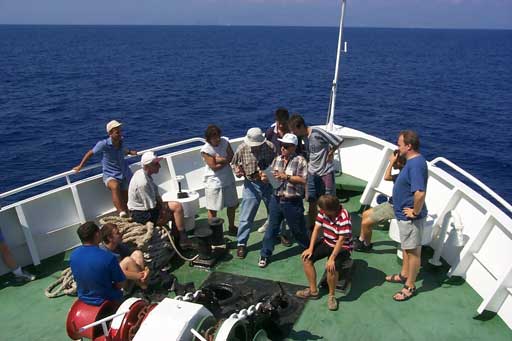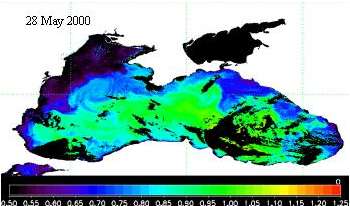
Training Course on Remote Sensing of Ocean
Color.
11-22 September, 2000
A Training Course on Remote Sensing of Ocean Color was held in Erdemli at the Institute of Marine Sciences, Middle East Technical University, Turkey on 11-22 September, 2000. One of the main objectives of the course was to broaden the user community for ocean color data. Besides theoretical courses a one-day oceanographic cruise aboard the Institute's Research Vessel Bilim was carried out that proved to be very much a highlight of the course. Sponsorship for the course came from BLACK SEA ECOSYSTEM PROCESSES AND FORECASTING / OPERATIONAL DATABASE MANAGEMENT SYSTEM Project of NATO Science for Peace Program , the IOCCG, and the Turkish Scientific and Technical Research Council (TUBITAK). This funding enabled thirty students and twelve lecturers from a total of fourteen different countries to participate in the course.
Students were drawn predominantly from countries surrounding the Black Sea (Turkey, Bulgaria, Romania, Ukraine, Russia, Georgia) with a few additional students from Azerbaijan, Lebanon, Italy, Oman and Morocco. Lecturers were invited from Turkey, Australia, USA, Russia and Canada to cover a range of disciplines fundamental to ocean-color studies. The full list of participants and their contact details are also available.
The main aim of the course was to provide the students with a basic grounding in the principles underlying remote-sensing techniques of ocean color plus the experience and confidence to implement such techniques back in their home institutions. To this end, the course consisted of two components; a theoretical and a practical component. The theoretical component comprised an intensive series of lectures covering a wide range of topics: regional oceanography and meteorology of the Black Sea/Mediterranean area; fundamentals of remote-sensing; radioactive transfer in the oceans; oceanic optical properties and various models; bio-optical algorithms; pigment optical properties; modeling reflected solar radiation; atmospheric correction algorithms; nutrients and productivity in the marine environment; productivity estimation from space platforms; and calibration, validation and interpretation of satellite data and model predictions.

Lectures aboard the R/V Bilim
The practical component comprised a series of carefully
designed hands-on activities made up of several contributions:
Intensive training sessions were provided on the use of SeaDAS
software, by instructors Peter Fearns and Helen Chedzey, (both from Curtin University,
Perth, Australia). The students worked in groups and
processed numerous SeaWiFS images covering the local
area (Black Sea and Mediterranean). These sessions, coupled with
instruction on installation of the SeaDAS software, equipped
participants with the skills required for image processing back
in their respective institutions.
and Helen Chedzey, (both from Curtin University,
Perth, Australia). The students worked in groups and
processed numerous SeaWiFS images covering the local
area (Black Sea and Mediterranean). These sessions, coupled with
instruction on installation of the SeaDAS software, equipped
participants with the skills required for image processing back
in their respective institutions.
Overall, the success of the course can be attributed to the dedicated team of lecturers and the interest and motivation displayed by the students.
Detailed information on the Summer Course can be obtained from the IOCCG web page: http://www.ioccg.org/training/turkey/turkey.html
Lecturers:
|